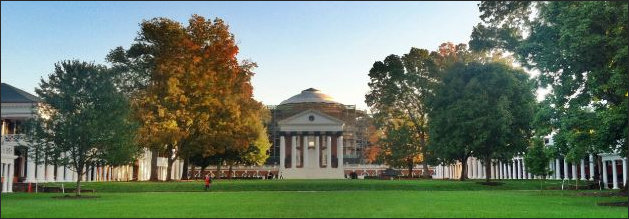
The University of Virginia — how meritocratic?
The news hardly comes a surprise but it’s unnerving to see the details in print: The University of Virginia’s fund-raising arm seeks to help the children of potential donors gain admittance to the university, according to documents reviewed by the Washington Post.
Writes reporter Rees Shapiro: “The records from the U-Va. advancement office, which oversees fundraising for the prestigious public flagship, reveal nearly a decade of efforts to monitor admission bids and in some cases assist those in jeopardy of rejection.”
One of several examples cited in the article:
The 2011 list, for example, shows that one hopeful was initially marked as denied. Then an advancement officer scribbled a handwritten note on the tracking file: “$500k.” A typed notation said “must be on WL,” for wait list. A final handwritten note urged, “if at all possible A,” for accepted. The final decision on the applicant was not shown.
A university spokesman denied that the admissions office coordinates with the advancement office, although he did acknowledge, “The Office of Advancement is occasionally contacted by alumni, friends and supporters recommending students who have an interest in attending U-Va. Such a practice is not unique to U-Va. and can be found at similar institutions.”
The Post obtained 164 pages of documents, mostly spreadsheets, from Jeff Thomas, author of the 2016 book, “Virginia Politics & Government in a New Century: The Price of Power,” who in turn had gotten them through a Freedom of Information Act request. In the book Thomas was highly critical of UVa admission and financial aid policies, but he did not make use of the materials he passed on to the Post.
The University is one of the richest schools in the country, with an endowment of $5.8 billion, notes the Post. Building the endowment through contributions is a never-ending preoccupation of the UVa brass. The funds are needed to meet the Board of Visitors’ ambitious goal to break into the ranks of the Top 10 universities in the country.
Bacon’s bottom line: So, UVa gives special treatment to students whose wealthy parents might donate big bucks to the university. UVa denies it happens, but nobody believes the disclaimers. The fact is, almost every university in the country does what UVa does. Every institution grubs for money to pay for its dreams of institutional glory.
But let’s put this in perspective. How frequent is the phenomenon, and how many meritorious students does the practice displace?
The documents cited by the Post show that the admissions office tracked at least 59 applicants for the incoming class of 2021. I do not know how Jeff Thomas phrased his FOIA request, but if we assume that he asked for all relevant documents and that UVa was responsive to that request, 59 is probably a ceiling.
How many of those 59 received preferential treatment? Consider the following possibilities:
- Some applicants would have qualified for admission on their own merits and needed no preferential treatment.
- Interventions were not always successful. As one advancement officer wrote in a tracking file: ““According to people who have talked to him, [the donor] is livid about the WL decision and holding future giving in the balance. Best to resolve quickly, if possible.” The implication here is that a resolution favorable to the donor was no sure thing.
- Not every one of the applicants who received an acceptance letter chose to attend UVa. Some students receive better offers elsewhere and turn UVa down.
Even if all 59 students got accepted, if all 59 owed their success to the good graces of the advancement office, and if all 59 decided to attend, they would have accounted for fewer than o.2 percent of the 36,807 applicants to the university that year, and only 0.6 percent of the 9,957 admissions.
Finally, let’s consider who would get knocked off the acceptance list. It wouldn’t be some poor kid from inner-city Norfolk or a coal mining town in Appalachia. UVa admissions prioritizes the best and brightest from poor communities. The victim probably would be an upper middle-class kid from Fairfax or Henrico counties whose SAT scores, high school transcripts and essays didn’t stand out quite enough. Gee, they might have to settle for Virginia Tech or James Madison, both highly regarded schools. What a heartbreak!
In terms of numbers, the displacement of 59 applicants by kids from mega-donor families is almost trivial. A far greater barrier to attending UVa is the ever-escalating cost of attendance. That’s where our focus should be.
Update: Jeff Thomas contacted me to say that the reason he didn’t use the FOIA’ed documents in his book is that the book was published in October 2016 and he received the materials in March 2017. “You’re correct in assuming that I requested ‘the list for all available years,’ and they provided them for the last ten. I did not request all the documents related to them.”


